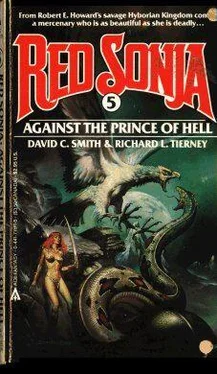David Smith - Against the Prince of Hell
Здесь есть возможность читать онлайн «David Smith - Against the Prince of Hell» весь текст электронной книги совершенно бесплатно (целиком полную версию без сокращений). В некоторых случаях можно слушать аудио, скачать через торрент в формате fb2 и присутствует краткое содержание. Жанр: Героическая фантастика, на английском языке. Описание произведения, (предисловие) а так же отзывы посетителей доступны на портале библиотеки ЛибКат.
- Название:Against the Prince of Hell
- Автор:
- Жанр:
- Год:неизвестен
- ISBN:нет данных
- Рейтинг книги:4 / 5. Голосов: 1
-
Избранное:Добавить в избранное
- Отзывы:
-
Ваша оценка:
- 80
- 1
- 2
- 3
- 4
- 5
Against the Prince of Hell: краткое содержание, описание и аннотация
Предлагаем к чтению аннотацию, описание, краткое содержание или предисловие (зависит от того, что написал сам автор книги «Against the Prince of Hell»). Если вы не нашли необходимую информацию о книге — напишите в комментариях, мы постараемся отыскать её.
Against the Prince of Hell — читать онлайн бесплатно полную книгу (весь текст) целиком
Ниже представлен текст книги, разбитый по страницам. Система сохранения места последней прочитанной страницы, позволяет с удобством читать онлайн бесплатно книгу «Against the Prince of Hell», без необходимости каждый раз заново искать на чём Вы остановились. Поставьте закладку, и сможете в любой момент перейти на страницу, на которой закончили чтение.
Интервал:
Закладка:
“Urmu!” he intoned, his voice ringing out like the sound of a brazen gong. “Urmu! Kadulu imest!”
His soldiers began to sweat, to murmur, then grew quiet once more.
“Urmu! Live again! Your power is revived! The city sheds blood for you, Urmu! I have conquered for you! The day is dark once more, Urmu!”
A wind grew from the sky, blew down. The full moon, shielded by wisps of cloud, suddenly shone free. The wind rose to a howl, making torches flicker; the soldiers’ capes and armor lacings fluttered and whipped.
Du-jum’s great black cloak wrapped around him, flapping.
“Urmu! Kidesh kidera! Rise, Vulture! Rise, wings of darkness! Behold with thy far-seeing eyes—the carpet of blood is laid before your feet! The prey of sacrifice is placed before your beak. Your magic lives again, O Urmu!”
The wind swept down; the fires flared again.
“Urmu! Show us your sign! Confirm us in our conquest! We worship you with magic and blood, we await your sign, O Urmu!”
A shriek suddenly came from within the old temple. Du-jum turned, still holding his hands high, and looked into the shadowed recesses. There were hurried footsteps, another shriek. A maniac face appeared, white, wild-eyed, and an arm holding up a knife. The madman paused for an instant in the open foyer of the temple.
“Dogs!” he screeched. “Dogs! Do you take Thesrad? Dogs!”
Then he rushed out, onto the portico, a knife upraised to stab the sorcerer. Du-jum laughed.
The wind suddenly rose to a whistling shriek, and high above, one of the vulture statues rocked, dislodged bits of grit and loose mortar, tilted, and plummeted, straight down.
“Do-o-gss!” screamed the madman.
Du-jum laughed again as, only three paces from him, the maniac was abruptly struck down by the falling statue. A huge thud—a loud crunching and snapping—and the man was crushed instantly against the flags of the portico.
A great pool of blood and brains oozed from beneath the fallen vulture. The bird was cracked and broken, but its stone beak was painted dark red with the blood of sacrifice. Du-jum’s laughter boomed. His soldiers, intoxicated with fanatical ecstasy, screamed out to the sky:” Urmu! Urmu!”
The wind died out, the moans still rose from the city, and Du-jum, howling maniacally, led his chorus of soldiers again and again and again in the same resounding chant:
“Urmu! Urmu! Urmu!” At last, it was replaced by another: “Du-jum! Du-jum! Du-jum!”
The moon was waning when he finally left the temple of Urmu and was escorted by his soldiers to the main palace.
As he entered, flourishing his great cloak, his soldiers who stood guard bowed and saluted. Slaves scampered before him, heads low, showing him the way to Omeron’s chamber.
Yarise was waiting for him there.
Du-jum entered. His guards pulled shut the door, remaining outside.
Silence, save for the whisper of the torches in the room. Yarise stood wide-eyed, proud, expectant. Du-jum tilted his head slightly to her and smiled gravely.
She reacted as though in the presence of a god: adoring, worshipful, approaching him with careful, soft steps, face tilted up, fingers dancing nervously on the air to touch him, yet poised to pull back instantly if the intensity of his glow should burn like flame.
Du-jum reached out his arms and laughed his booming, maniacal laugh.
Yarise threw herself at him, kissed him passionately, held him, stared into his burning eyes, held him again, crushing her breasts against his armor and the hideous bird on his chest, rubbing her face against his with wild exuberance.
“I am yours!” she breathed. “The city is ours, Du-jum—Ours! Ours! And I am yours!”
The screams, the cries, still came faintly through the window. Winds whistled. Soldiers tramped and marched.
“Yours, Du-jum! After this long wait!”
“A night of vengeance and shadows!” growled the dark sorcerer. “A night of blood and fire and stone vultures, and now—” He lifted Yarise easily in his mighty arms. “A night of power and conquest and ecstasy!”
Yarise returned his gloating smile as she was carried to her bed—to Omeron’s bed.
Chapter 2.
Night—and the encampment sat in it like a tiny cluster of lost lights at the floor of an immensely deep black well. Forest and the steep wall of the mountainside loomed all around. Far above, between thin clouds, stars shone down. A few voices still droned on, subdued with sleep, almost gentle. Coals dimmed at the bottoms of dying fires. And the eyes of the sentinels, like those of alert animals in the darkness, kept watch; their ears strained for the slightest sounds. Hands hovered not far from swords. Far, far below, silent, lay the city.
Sonja, still ill, slept as deeply and passively as she had slept in the womb. But Omeron, watching her and listening to the night, could not sleep.
The yearning for vengeance ate at him like a crawling disease, mounted in him and would not abate, like an obsession. The appearance of this ill, red-haired swordswoman, an outlander, seemed to Omeron a kind of puzzle or symbol, which he could not yet fathom. Surely it was an omen, a much-needed omen of hope. He would not ignore it or doubt it now. For how many images and puzzles and symbols had he ignored in the past nine months, stupidly and carelessly, when an open eye, a discerning ear, a thoughtful pause might have warned him of the darkly impending future?
He shook his head angrily, stood up, and stretched. He felt utterly tired, exhausted, but his brain would not let him rest. Quietly he walked to where Red Sonja lay sleeping, and looked down at her, lost in thought. He murmured a brief prayer to the gods that her coming might mean something, that this symbol might be understood. Beyond Sonja two wounded men lay. Omeron went to them and quietly knelt, placed his hands on their foreheads, and then felt for the pulse of each. One pulse was weak; the other was nonexistent.
Mentally Omeron subtracted another life, calculated another score to be settled with Du-jum and Yarise. Ishtar and Eliel! His very wife!
“Bring her to me now, O Gods!” he muttered quietly. “Bring her, and let me throttle her slowly. Let these anguished men tear her to pieces, let her die and be brought to life again many times, so that she may suffer the death of each of her victims! Each of my victims! Aye, my victims! For I, too, am responsible!”
Harangued by his conscience, he walked on past the wounded, coming to a sentry. The soldier saluted. Omeron whispered something briefly to him; the man did not understand.
“Go on,” Omeron bade him once more. “Get some sleep. I cannot rest, I’ll take your place.”
The man was reluctant. “It’s all right, sir. Really. . . .”
“None of us is all right. Go get some sleep. Nothing is happening tonight. Nothing will happen until—until we make it happen.”
“As . . . you wish, Lord Omeron.”
The soldier went off, saluting, then yawning. Omeron turned from him, stared down at the ghostly lights of Thesrad.
Behind him, the sentry let out a gasp.
Omeron turned instantly. “What is it?”
The man nodded towards thick forest off to one side: shrubbery, undergrowth partially concealed by mountain rocks, almost wholly darkened by the night.
Omeron walked quietly to the soldier, gesturing for silence.
The man was shivering with tension. He drew out his short sword, and used it to point towards the dark forest. Omeron placed a hand on his shoulder and watched, leaning close.
“What?” he whispered.
“A noise. Something.”
“Are you sure?”
Long moments of silence, darkness, the groans of sleeping men. None else in the camp was roused. Staring at the corner of darkness brought blurs to Omeron’s eyes. He almost felt that he could no longer be certain he was alive, much less that he had heard—
Читать дальшеИнтервал:
Закладка:
Похожие книги на «Against the Prince of Hell»
Представляем Вашему вниманию похожие книги на «Against the Prince of Hell» списком для выбора. Мы отобрали схожую по названию и смыслу литературу в надежде предоставить читателям больше вариантов отыскать новые, интересные, ещё непрочитанные произведения.
Обсуждение, отзывы о книге «Against the Prince of Hell» и просто собственные мнения читателей. Оставьте ваши комментарии, напишите, что Вы думаете о произведении, его смысле или главных героях. Укажите что конкретно понравилось, а что нет, и почему Вы так считаете.












